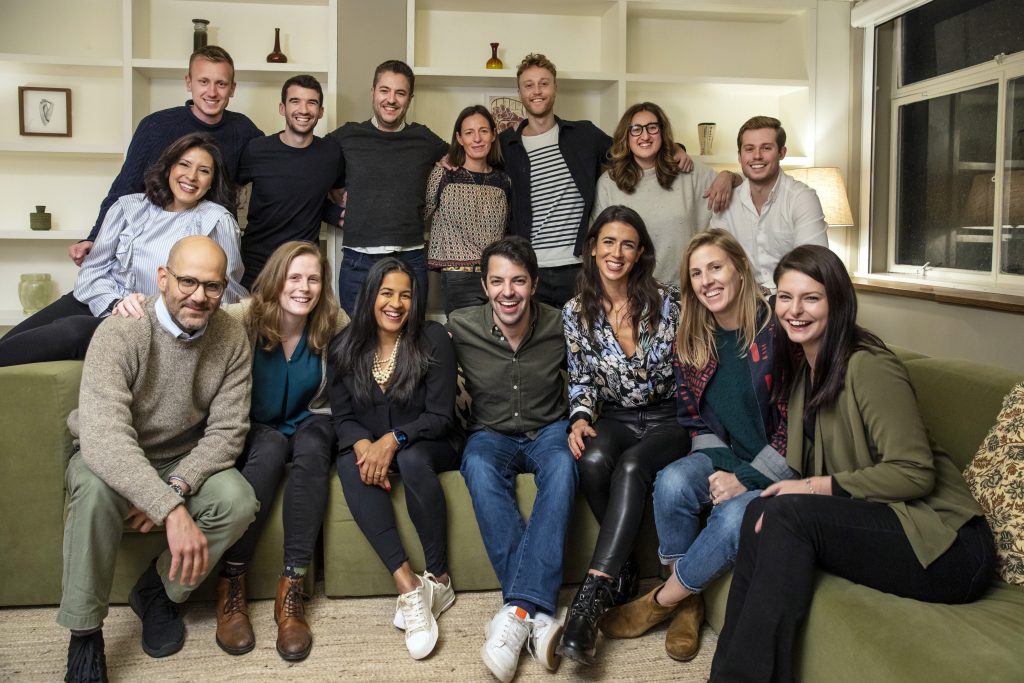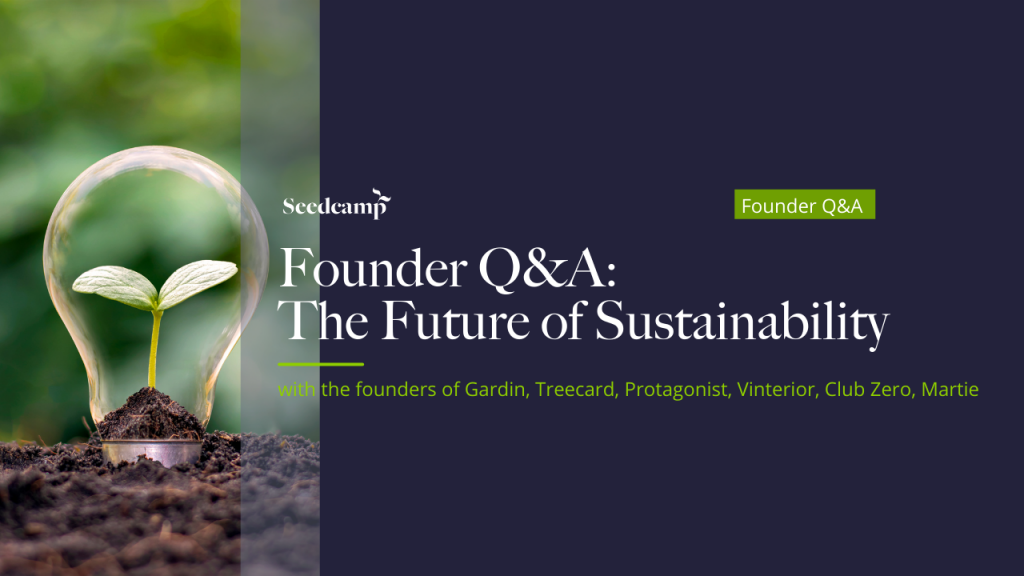50 new companies, £4Bn+ in follow-on funding, and two Seedcamp companies list publicly
It feels like a daunting task to reflect back on what has arguably been the busiest in our 14-year history at Seedcamp. 2021 has been a year of incredible highs, with some amazing successes and reasons to celebrate across our core team and portfolio companies. We’d be remiss to overlook that — with all the highs — it’s also been a challenging year; both globally and for many of us personally. So, we start this year’s reflection with a much-needed and massive Thank You to everyone who has contributed to making this crazy year one of our best yet.
It’s no secret that pace has been the name of the game this year. With so much talk of inflated rounds, bubbles, and bull markets, we’ve remained firm in our core belief: that exceptional talent can come from anywhere and focused on investing and supporting those founders we believe are building the businesses that will help shape the future we want to be a part of. It’s been no mean feat! This year, we’ve invested in 50 new pre-seed and seed-stage companies building everything from the technology to simplify borderless transactions for commerce across Africa to contextual search tools to help improve workplace knowledge.
And while we’ve increased our pace of investment, we’ve also doubled down on the support we provide to our portfolio companies once they become part of the Seedcamp Nation, building our core team and extended network of experts. What’s also been amazing to see is the Seedcamp flywheel truly come into its own this last year. We’ve had employees at portfolio companies become EiRs. We’ve had experts from companies such as Hopin, Pleo, Elliptic, and Revolut share their expertise and wisdom with our early-stage companies through our mentorship programme and workshops. We’ve had portfolio founders co-invest alongside us in new rounds. And, we’ve invested in people who’ve come through our mentor network. All this is just a snapshot of what has gone on behind the scenes this year and reflects why we remain steadfast in our belief that the Seedcamp Nation truly is a founder’s unfair advantage.
This year our portfolio collectively raised £4Bn+, 2x more than all other Seedcamp years combined
This year has been one of many firsts for us. In April, we celebrated our first company to go public as Romanian-founded UiPath listed on NYSE. That momentous occasion was followed just a few months later as Wise, one of the most well-known and well-loved FinTech companies in Europe and, increasingly, globally, became the first technology company to list on the London Stock Exchange.
An eye-watering stat for 2021 is that this year our portfolio collectively raised £4Bn+, which is 2x more than all other Seedcamp years combined. The unicorn count continued as Sorare, Pleo, and wefox all joined the fold, and the pace of follow-on rounds reached truly unparalleled heights, with Hopin raising a Series C and D in a matter of five months and Revolut hitting a $33Bn+ valuation. Other standout rounds came from Grover, Primer, Synthesia, Rossum and Ramp.
If you’ll indulge us, and as people who tend to be pretty rubbish at celebrating our own wins as there is ‘always more to do’, we have to take a moment to appreciate so much of the amazing recognition that came this year. Reshma and Carlos were awarded MBEs for their service to technology and then won GP Bullhound’s Investor of the Year, where we also were celebrated as Seed Fund of the Year. And we rounded things off with Reshma and Carlos making it onto the Midas List for the 4th year in a row.
There are many faces and people that make Seedcamp what it is today. As we enter our 15th year, we remember that we couldn’t have done any of this without the exceptional support and ambitious work of our founders, LPs, Venture Partners, EiRs, mentors, and everyone involved in the Seedcamp Nation. We wish everyone the happiest and healthiest of holidays and cannot wait for what’s in store for 2022.

Portfolio Highlights
A snapshot of the 50 startups who joined the Seedcamp Nation in 2021
Seedcamp Podcast
As ever, we’ve had the pleasure to talk to some exceptional people across all parts of the tech community, including founders, VCs, and thought leaders. Here are some of our favourite episodes from 2021:

We’re currently living in the decisive decade for creating a lasting, positive impact on our planet. Previously, we published a deep dive on the future of sustainability and highlighted some of our portfolio companies spearheading the way. On the back of this, we spoke with six of our founders from Gardin, Treecard, Protagonist, Vinterior, Club Zero and Martie, who are all building mission-driven businesses, on what the future of tech holds for sustainability. It was great to get their collective opinions on some of the questions below:
Founder Sumanta, and Data Scientist Julian from Gardin, “The future in store for sustainable technology is that soon everything will be sustainable technology. The success story of renewable power will continue and multiply into industries outside electricity, unleashing a transformation of the world economy. We are already seeing a dramatic shift in the positioning of the world’s largest brands to align their products with the sustainable agenda. What is currently a hip marketing trend will imminently become consumer expectation. This has been one of the biggest successes of the climate movement and will make it easier than ever before to make consumer choices which are ‘sustainable’.”
Jamie, Co-Founder and CEO of Treecard: “In consumerism, this is a vertical built primarily on trust and authenticity. Once a brand has built sufficient trust mass, they’ll sweep up. I’m biased but I think we’ll see a Revolut-style superapp that encompasses everything from offsetting, to diet, and green investing, saving and spend tracking. There’s no need for these things to be fragmented and their utility to the consumer become far more powerful when combined. Just as with electric cars we expect, eventually, that non-green finance institutions will become a no-go (i.e. every bank will need to become environmental). We expect that the winners in this situation will be the Tesla’s who built a reputation and a customer base in advance of the flip.”
Treecard: “Yes, in so far as it would be significantly better for the planet if we were all dead. Given we’re here to stay, and we need to consume to survive, it’s better that consumption is steered in a sustainable direction. There’s nothing paradoxical about a platform which does that.`’
Treecard: “It’s ultimately bottom-up; businesses don’t care until it affects the bottom line. That said, I’m still skeptical that it’s possible at all.”
Upendra, Founder of Protagonist: “The sustainable (no pun intended) way to align capitalism with sustainability is to go deep and shift our cultural norms, towards one of stewardship, of care for one another. Viewed through Stewart Brand’s Pace Layering Model, changes in consumer and business behavior matter most if it’s dramatic enough to pull culture with it.”
Gardin: “Conscious decision making by consumers has real knock-on effects to product supply chains that will cause companies to source low-carbon inputs even at a premium cost. For example, Apple has decided that all its products and supply chain will be carbon neutral by 2030, which means everything from the silicon transistors to the aluminium body or steel frame must be made without releasing greenhouse gases. When the largest consumer technology company makes such a decision, the pressure on upstream producers is huge and we expect to see similar changes occurring rapidly across all consumer sectors.”
Sandrine, Founder of Vinterior: “You need both. Consumers making this choice can be constrained by factors such as affordability, limited access, time or lack of information. Without businesses making sustainability part of their operating principles and strategy, sustainable choices might not be readily available to consumers, or to a fraction of consumers only.”
Louise, Co-Founder of Martie: Through federal regulation and businesses truly thinking about their impact, we can start to see a shift. Every business needs to have a sustainability angle, otherwise you should not be in business at all. We are in an “all hands on deck” situation, and building a better future on a business level is non-negotiable. Consumers should never settle for less.”
Protagonist: “I’ll again refer to the Pace Layering Model. Commerce, infrastructure, governance, and culture all move together. We need to turn the crank at every layer.”
Gardin: “There are many ways in which this optimistic future does not come to fruition. Governments must incubate new technologies to scale, implement policies that support sustainable business models and help transition fossil fuel communities to new opportunities. Consumers must continue to make active decisions to be sustainable, without which there will be no driver of change. Although the rise of ESG investing has been effective at bringing these issues to the boardroom level, there is a risk of bold promises with little action. Already we see that despite the acknowledgement of material climate risks and commitments to net-zero ambitions, companies continue to ignore these factors in their financial statements with the associated increase in liabilities and impaired assets. These companies must be held to account and stricter rules are required.”
Safia, founder of Club Zero: ‘Ultimately consumers are the common denominator to everything. They sway buying power, they sway the vote (impacting policies and legislation) and they shape the health of major businesses today. What informs the consumer is the key — media. The emergence of climate tech products and services are a direct result of consumer awareness, increasing on climate change which has generated a new demand for goods and services.”
Protagonist: “The data shows that we are demanding that businesses behave at a “higher” societal and environmental level. As producers, employers, as brands. Fantastic. The crank is turning. That’s how our cultural norms get rewired.”
Martie: “Consumers have so many choices available to them – almost too many choices! And with so many messages and ads and ideas being delivered to them constantly, they are making purchasing decisions based upon their beliefs.”
Interested in learning more about the topic? Listen to our recent podcast episode about all things sustainable materials:
This Much I Know: The Power of Consumers and The Future of Sustainable Materials
Copyright © 2019 Seedcamp
Website design × Point Studio